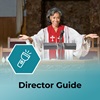Note: This article is excerpted from The Bible Study Handbook.
I once threw a "What I Like About You" surprise party for my husband, Jon. I contacted his friends, colleagues, and church community, asking them to send me short phrases that describe what they like about Jon. I printed out these words and phrases on colored paper and used them as the decorations for his party. It was so much fun to see what other people wrote about him. Most of them were the kinds of things you would expect: "thoughtful," "wise," "generous," "steady," "loves his family" and so on. But there were also some odd ones: "throws a great hammer"; "deadly accuracy with a Frisbee"; and my favorite, "heart of gold, feet of lead."
The last group came from my husband's Ultimate Frisbee team. A random assortment of graduate students, professors, and others have been playing together for almost 20 years, and Jon has been a central member of the team for the last eighteen. Week in and week out, whether in the heat of a humid Iowa July or the icy cold of January, they spend part of their Saturday afternoon together running, throwing, and catching a plastic disc.
As with any sports team or musical group, the love of the game brought them together, and the experience of playing together has created friendships. They have inside jokes, nicknames, and shared history. Jon is teased about his speed (thus the "feet of lead" comment) but admired for his skill in throwing. Many of the folks who play on Saturday have played together so much that they can anticipate each other's moves, completing elaborate plays with very little communication.
Without this group, Jon wouldn't be able to enjoy the game he loves. Playing Frisbee by yourself just doesn't work.
God wired us for community. It has often been noted that in well functioning teams the sum is greater than the parts. The apostle Paul would definitely agree, as seen in his use of the image of a body to describe the church. A Christian leader I respect puts it this way: "We're better together." Life lived or tasks accomplished in community are both more enjoyable and more effective.
Though I am a strong advocate for regular personal Bible reading and study, I am convinced that every believer needs to regularly study the Bible with others. Let's discuss one of the reasons communal Bible study is essential to the health of the body of Christ.
Amplification
Amplification is any technique that makes sound louder and clearer. In a large room or a setting with a lot of white noise, a microphone enables the primary speaker to be heard and understood by a greater number of people. In Luke 5 Jesus amplifies his voice by getting into Simon's boat and speaking from the lake rather than the shore. Communal Bible study similarly amplifies our experience of the Scripture. Like a P.A. system, the process of studying together enables every element of inductive Bible study to come across louder and clearer.
All six primary elements of inductive Bible study—cultural context, historical context, attentiveness, curiosity, understanding, and response—are strengthened and deepened when studying the Bible in community. It is amazing how much more can be seen when six or eight pairs of eyes, rather than just one, look closely at the text. Small-group Bible studies are able to ask more penetrating questions, pool insights, challenge assumptions, and create an environment that is dynamic and lively.
Furthermore, when we study in community we are helped to sit longer with one passage. Too often our personal reading is a quick read through. On our own it is too easy to let the Scripture go "in one ear, out the other." But a passage that can be read in three minutes can also be discussed for two hours. Members of groups that have had extended discussion, even arguments, about the interpretation of a passage come away with a sharper understanding and a higher retention rate.
Sharing Perspectives
In inductive manuscript study, the more diverse the community the better. Through seeking to approach the text inductively we attempt to lay aside our preconceptions and bias, but it is impossible to do so thoroughly. We bring our experiences and presuppositions with us to the text. We all have blind spots that cannot be exposed without the help of others. Diversity increases the variety of perspectives and enables a group to consider the text from different angles.
Some of my best experiences in the Bible have been with non-Christians. They don't take a lot for granted. They ask questions of the text that had never occurred to me, and those questions prove to be deeply fruitful. By wrestling with the perspectives and questions of those who don't have allegiance to Jesus, my faith is deepened and my understanding expanded. It's likewise invaluable for men to study with women, older folks with teens, wealthy with poor, Westerners with those from the global south and so on.
I recently spent several days participating in a dig-in of the Gospel of Luke. The group was comprised of people from all over North America (including Saskatchewan and Montréal). The ages ranged from the 20s to the 50s, and four different ethnicities were represented. When studying the parable of the great banquet in Luke 14, someone read verse 23 and asked, "Why does the master tell his servant to compel people from the roads and lanes to come to the banquet?" We struggled for a while trying to answer this question from the text, wondering if the master even cared about the people in the roads and lanes or if he only cared about numbers. We felt very uncomfortable with the possibility that this Scripture in some way supported forced conversions.
In the midst of our wrestling with the text, a man who was born and raised in the Middle East shared a story about his parents and hospitality. In their culture, the value of reciprocity requires that any gift or invitation be matched in the coming months. With this information, the meaning of the text jumped out at us. The servant must compel the poor farmers and travelers to come to the banquet because they are in no position to repay the invitation. Those who represent the master must assure them again and again that the master wants them to enjoy his feast even though they cannot reciprocate.
For those who gather around God's Word with a common desire to grow as Christians, experiences of communal Bible study can produce deep joy. Over our four days of studying Luke, the joy and energy level in the room built day by day. There was joy when a new insight emerged or a connection was made with earlier passages that had never been considered. There was the joy of seeing something built (our understanding of Luke), like the feeling of satisfaction you have when building a new deck or restoring an old car. Each day we found more to laugh about as we played with language and the text, and as our relationships grew we found ways to lovingly tease each other.
Group Bible study amplifies insight, understanding, perspective, and joy. "Turning up the volume" through studying together enables us to hear and enjoy the beauty and power of the Scriptures.
—Lindsay Olesberg. Taken from The Bible Study Handbook by Lindsay Olesberg. Copyright 2012 by Lindsay Olesberg. Used by permission of InterVarsity Press.









